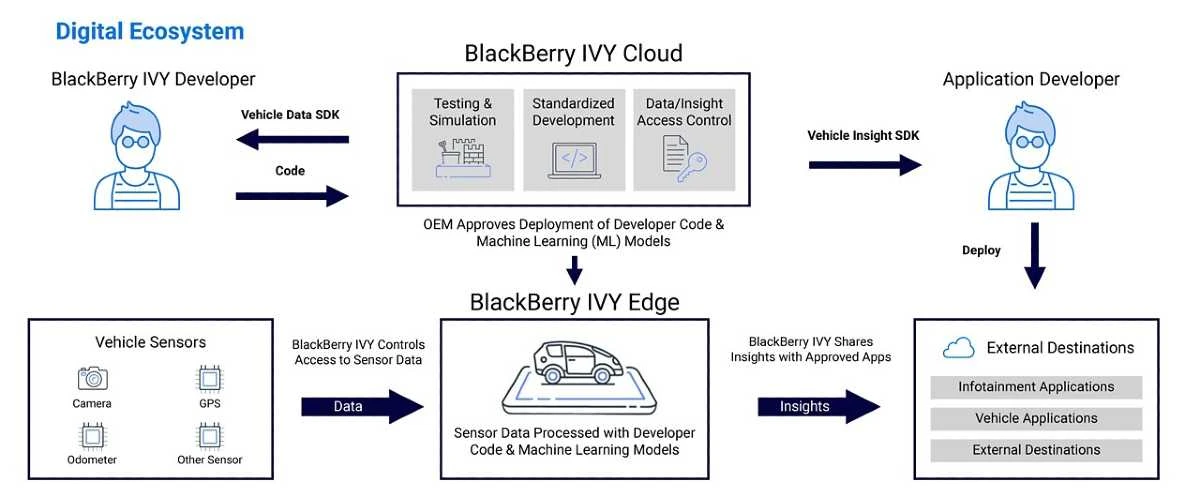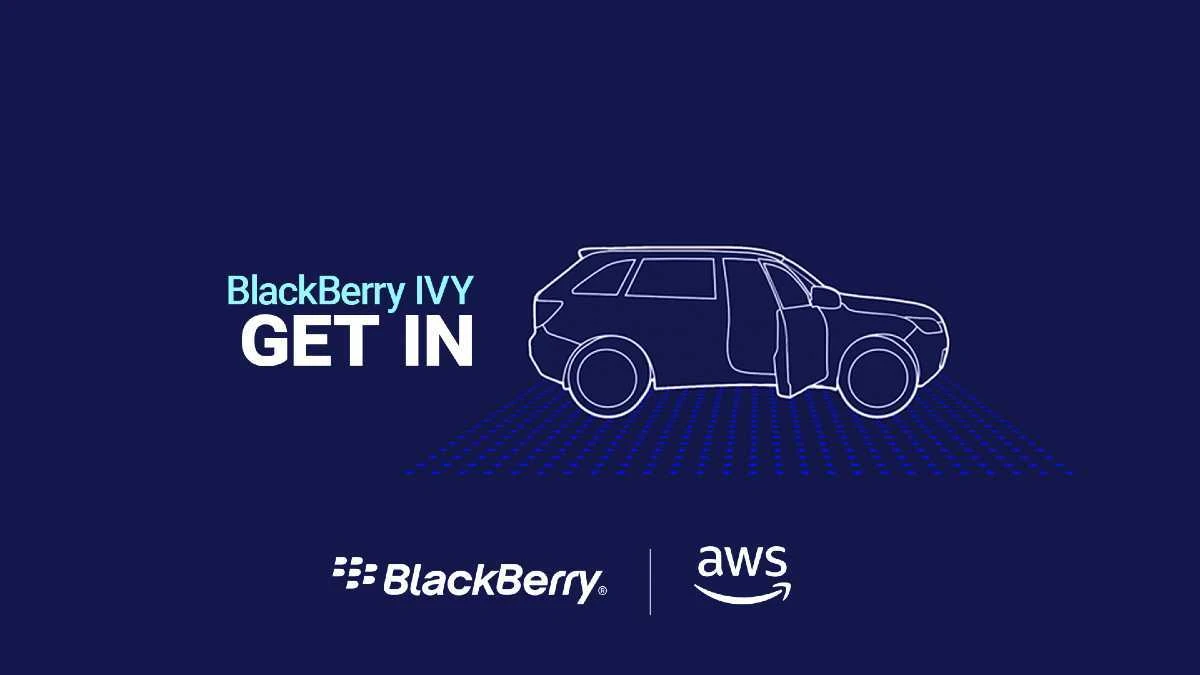Frost & Sullivan has named BlackBerry IVY an industry leading edge-to-cloud software platform for automakers and smart cities. In the published report, Frost & Sullivan conclude that BlackBerry is revolutionizing the connected-autonomous ecosystem with BlackBerry IVY.
The report reviews the key challenges faced by the automotive industry today as vehicles become increasingly complex and connected. Frost & Sullivan state that BlackBerry IVY uniquely meets the needs of the automotive industry as it standardizes data access across all vehicles, regardless of brand, operating system, and cloud deployment model.
“Connected-autonomous vehicles are the enabler for smart cities, which means the keys to the car are becoming the keys to the Internet of Things,” said John Chen, Executive Chairman & CEO, BlackBerry.
“We are delighted that BlackBerry IVY has been named an industry leading platform for automakers and smart cities. BlackBerry IVY transforms the dream of a unified connected-autonomous IoT into a reality and strengthens our existing market leadership position.”
The report goes on to determine that a common vehicle platform must extend to smart cities, which creates an IoT market forecasted to reach over $45 billion by 2025. BlackBerry IVY unifies industries and paves the way for advanced smart cities, where communication between vehicles, infrastructure and third parties is seamless.
“BlackBerry IVY is a revolutionary, intelligent, edge-to-cloud software platform, which unites automotive industry participants to accelerate the development of connected-autonomous vehicles while simultaneously enabling smart cities around the world,” said Nicolas Inchaustegui, Senior Consultant, Automotive, Transportation & Mobility, Frost & Sullivan.
“Today, BlackBerry has a significant footprint across the automotive industry and is central to smart cities. With IVY, BlackBerry becomes even more fundamental to these markets.”
BlackBerry launched the BlackBerry IVY Advisory Council this week, a new invitation-only body comprised of leading companies across the transportation and mobility industries that will help shape and advise the BlackBerry IVY development community and the vertical-specific services and automotive applications that will be brought to market using BlackBerry’s Intelligent Vehicle Data Platform, BlackBerry IVY.

Announced in December 2020 as part of a multi-year, global agreement with Amazon Web Services (AWS), BlackBerry IVY is a scalable, cloud-connected software platform that will allow automakers to provide a consistent and secure way to read vehicle sensor data, normalize it, and create actionable insights from that data both locally in the vehicle and in the cloud. Automakers can use this information to create responsive in-vehicle services that enhance driver and passenger experiences.
BlackBerry IVY addresses a critical data access, collection, and management problem in the automotive industry. Modern cars and trucks are built with thousands of parts from many different suppliers, with each vehicle model comprising a unique set of proprietary hardware and software components.
These components, which include an increasing variety of vehicle sensors, produce data in unique and specialized formats. The highly specific skills required to interact with this data, as well as the challenges of accessing it from within contained vehicle subsystems, limit developers’ abilities to innovate quickly and bring new solutions to market.
BlackBerry IVY will solve for these challenges by applying machine learning to that data to generate predictive insights and inferences, making it possible for automakers to offer in-vehicle experiences that are highly personalized and able to take action based on those insights.
BlackBerry IVY will support multiple vehicle operating systems and multi-cloud deployments in order to ensure compatibility across vehicle models and brands. It will build upon BlackBerry QNX’s capabilities for surfacing and normalizing data from automobiles and AWS’s broad portfolio of services, including capabilities for IoT and machine learning.
BlackBerry IVY will run inside a vehicle’s embedded systems, but will be managed and configured remotely from the cloud. As a result, automakers will gain greater visibility into vehicle data, control over who can access it, and edge computing capabilities to optimize how quickly and efficiently the data is processed.
With BlackBerry IVY’s integrated capabilities, automakers will be able to deliver new features, functionality, and performance to customers over the lifetime of their cloud-connected vehicles, as well as unlock new revenue streams and business models built on vehicle data.
For instance, BlackBerry IVY could leverage vehicle data to recognize driver behavior and hazardous conditions such as icy roads or heavy traffic and then recommend that a driver enable relevant vehicle safety features such as traction control, lane-keeping assist, or adaptive cruise control.
IVY could then provide automakers with feedback on how and when those safety features are used, allowing them to make targeted investments to improve vehicle performance.
Additionally, drivers of electric vehicles could choose to share their car’s battery information with third-party charging networks to proactively reserve a charging connector and tailor charging time according to the driver’s current location and travel plans.
BlackBerry IVY could also provide insights to parents of teenage drivers who may choose to receive customized notifications based on insights from vehicle sensors when the number of passengers in the vehicle changes, when the driver appears to be texting, distracted, or not observing speed limits, or when the vehicle occupancy level rises above the parents’ desired safety threshold.
Similarly, parents of infants could receive a reminder to engage the child safety lock when the vehicle detects a child in the rear seat.
BlackBerry IVY will enable automakers to compress the timeline to build, deploy, and monetize new in-vehicle applications and connected services across multiple vehicle brands and models.
Instead of investing in one-off solutions that conform to the unique engineering of different vehicle models (as they do today), automakers using BlackBerry IVY will be able to leverage different types of data as common building blocks for new services that could work across a range of models.
Automakers will be able to use the platform’s application programming interfaces (APIs) to share data and outputs with their software development teams, giving them the ability to innovate, while also protecting customer privacy and security by controlling whom can access vehicle and app data and at what level of detail.
In addition, BlackBerry IVY will make it easier for automakers to collaborate with a wider pool of developers to accelerate creation of new offerings that deliver improved vehicle performance, reduced costs for maintenance and repairs, and added convenience.
For instance, by analyzing real-time performance data, automakers could recognize the first signs of potentially faulty parts, deploy code to identify affected vehicles, notify impacted drivers, and perform targeted recalls.
Automakers will be able to remotely deploy and update the software from the platform’s Cloud Console (a web interface for managing BlackBerry IVY) to continuously improve the functionality of the system.



